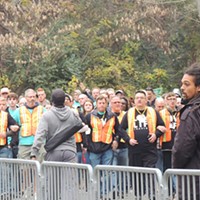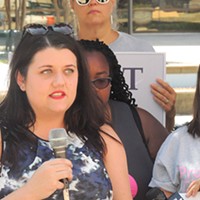To drive down Latrobe Drive with your windows up on a Saturday is to believe you're possibly the most popular person on the planet.
People stand in the road, beckoning for you to pull over and chat. Smiling strangers peer in your car like paparazzi, wanting to hand you flyers.
It's not until you roll down the windows to engage with one of these folks — when the sounds of fired-up men on loudspeakers yelling about hellfire and damnation float in — that you get a taste for what Latrobe Drive really is: the most contentious street in Charlotte.
As I walked into the office of Calla Hales, co-owner and head administrator at A Preferred Women's Health Center (PWHC), arguably the biggest abortion provider in the South, I mentioned how intense the experience of getting to the building was.
"This is a slow day," Hales said with the knowing laugh of someone who's been in the trenches of a stalemate war for years.
Six days a week, Hales shows up at around 8:30 a.m. to run the business she took over in February 2016. The protesters are usually already set up outside at that point, and at 9, patients begin to show up for appointments and protesters crank up the megaphones. The yelling doesn't stop until about 1 p.m.
It's been like this since Hales' parents opened the facility 15 years ago, but over the last year, things have escalated.
"You missed it," she said as I came in at 9 a.m. "At 8:15 they were already on the loudspeakers talking about, 'Are you willing to die today?' The police didn't do anything."
Since moving to Charlotte to take over the business, a large part of Hales' job has involved dealing with the people outside and communicating with police to make sure they're enforcing the numerous ordinances she says protesters violate daily.
Hales said she's been personally targeted by protesters who have read off parts of a rape kit report from the time she was sexually assaulted, told her "you look better on your back than behind a desk" and even asked for a birth certificate to prove she isn't "a demon summoned from hell."
Hales is aware of the risk inherent in her position. Her father was a close friend of Dr. George Tiller, a physician who was murdered in 2009 for his role in providing abortions by a Christian extremist.
"[My father] is a little nervous that I still do this," she said. "He and my mom both chose to take the backseat on being public, but with everything that's going on — the recent escalation — we can't be quiet."
The folks milling around outside the facility are from a conglomerate of different anti-abortion organizations.
There are the ones dressed in purple standing outside an RV offering free ultrasounds and other health care. They're with Pregnancy Resource Center of Charlotte, and their goal is to lure patients way from the clinic, or at least distract them long enough to miss their appointments.
Counter-protesters have taken to standing across from them with signs clarifying that the RV is not affiliated with the clinic.
On Saturdays, large groups of churchgoers recruited by an organization called Love Life Charlotte have taken to marching down Latrobe Drive and holding prayer circles in front of the clinic. Most of them are first-timers, as congregation members far (Kannapolis Church of God, Midway Baptist Church) and near (Elevation Church, Hickory Grove Baptist Church) sign up to walk together on their assigned Saturday.
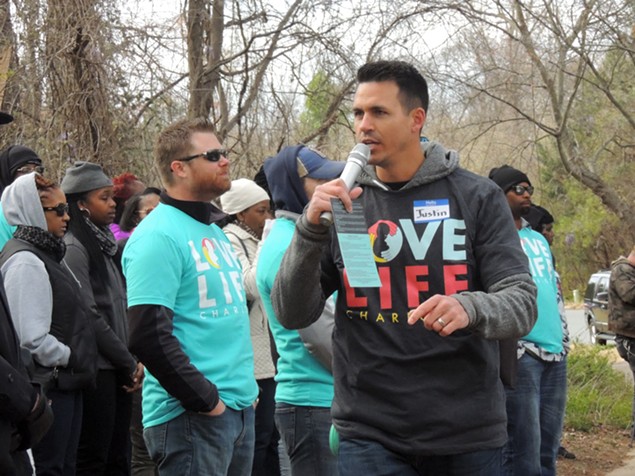
- Ryan Pitkin
- Justin Reeder of Love Life Charlotte speaks to church members standing in front of PWHC.
On a recent Saturday, Love Life Charlotte founder Justin Reeder marched his followers to a small piece of land across the street from Hales' clinic and began a sermon.
"God wants to see abortion end more than we do. He's just waiting for the Church, he's waiting for us," Reeder told those standing before him. "These are the gates of hell, Church. Make no mistake, there is no darker place that exists in our city. Matthew 16:18 tells us that the gates of hell will not prevail against the church."
He passed the microphone off to a woman who sang a couple Christian songs into the speakers. The group was blatantly violating an ordinance regulating amplified noise in public places while uninterested police stood nearby, but they were relatively peaceful compared to the vitriol being spewed through the same speakers just minutes before, and which would follow for hours after they left.
Once the singing was done, Reeder passed the mic to Daniel Parks, after praising him as someone who had been leading the fight outside the clinic for well over 10 years.
Along with being co-pastor at the Christ Fellowship in Davidson, Parks has led the "ministry teams" standing outside PWHC since joining with an organization called Cities4Life in 2005. David Benham, son of infamous evangelical extremist Flip Benham, leads Cities4Life.
Flip was found guilty of stalking a doctor who worked for PWHC in 2011. He also distributed flyers with the personal information of multiple people who worked at local providers, including PWHC.
Flip, whose family lives in Concord, has been known to join the ministry teams on Latrobe Drive, while David and his brother Jason show up twice a week, Hales said.
"We're arguably the worst clinic in the nation for protesters," she said. "If you asked any of those protesters [with Cities4Life] out there where they were from, not a single one would be from Charlotte. They're all from surrounding counties and suburbs, and unfortunately, North Carolina lends itself to that; there are a lot of pocket congregations that go toward the extreme."
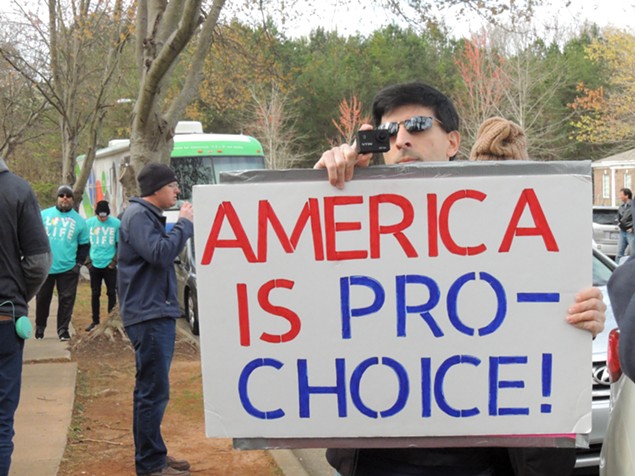
- A counter-protester aims a sign and a camera at a group of protesters (behind the camera). Daniel Parks, leader of extreme anti-abortion group Cities4Life, stands behind him speaking into a microphone hooked to a large speaker aimed at the clinic.
Hales also cites the location of the clinic as another reason protests at the east Charlotte location feel so overwhelming to an unsuspecting patient. The lasso that is Latrobe Drive curves around and reconnects with itself, creating a roundabout that can seem hard to escape, especially with folks closing in on your car, yelling at you to stop.
Jasmine Sherman volunteered as an escort at the clinic in April 2016, walking patients from their cars to the building while blocking them from the sounds and signs of the protesters with blankets and umbrellas.
Since then, she's "crossed over," as she called it, becoming a full-time pro-choice protester, standing outside the property line face to face with anti-abortion protesters in attempts to drown them out and hold them accountable.
Still, she holds with her the experience of helping women who arrived at the clinic on a daily basis.
"It is traumatic. They go through two gauntlets. You have people [at the RV] who randomly step in the road, in front of the cars, and they're flagging you down and you don't know who that is, you just know you don't want to hit somebody, so you stop," Sherman said.
"If they get past the RV, they have to make it through this group of people [she points at Cities4Life protesters camped out at the driveway] who are walking into the street trying to give them pamphlets. So when they make it here finally, most people are angry, they're upset, they don't know who the escorts are, they lash out. They're upset or they're crying, it's a lot of emotion."
It was this "gauntlet" of harassment that struck Charlotte City Councilwoman Julie Eiselt when she visited Latrobe Drive on a Saturday in February.
Eiselt was immediately initiated into the harassment faced by pro-choice volunteers who show up to the clinic on a daily basis. Anti-abortion protesters rabidly harassed Eiselt, calling her "baby killer" and following her around while filming her, later sharing the video on YouTube. Despite the personal experience, Eiselt was most affected by the difficulty with which innocent patients had in entering the facility.
She was concerned with the apathy she saw among the few cops standing around as protesters entered the road and blared loudspeakers at patients in the parking lot.
"I understand the police are backed into a corner to some extent, but when I was down there, there were five to seven cars parked up the street monitoring sounds. So I said, 'Stand 11 feet way from them and monitor the sounds.' The ordinance is 75 decibels from 10 feet away," Eiselt said. "They say, 'We don't want to get in the middle of it and incite violence,' but to me, I have a hard time with that argument, because they're the police. If they incite violence then they're the ones who can handle it, in theory. That's what we hire them as a city to do."
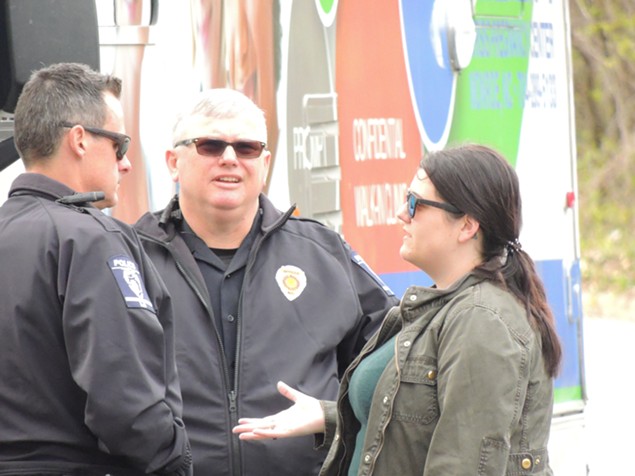
- Calla Hales speaks with police about enforcing ordinances at a recent protest.
CMPD Deputy Chief Jeff Estes said he has heard reports from commanding officers in the Providence Division that tensions on Latrobe Drive have escalated in recent months. He also said the situation there is one of the most difficult things the department has to deal with.
"This is where constitutional rights of individuals come against each other: rights of freedom of movement come against rights of free speech," Estes said. "The law becomes very difficult in which to apply. Depending on which side you're on, it's never applied fairly. You absolutely never make anyone quote-unquote happy."
Estes said his officers have been working recently to improve communication between police and people like Hales, as well as Cities4Life organizers. Hales said police cooperation has improved slightly in 2017, but says they only began paying attention after December, when Love Life Charlotte brought 3,000 people to her clinic, leading to coverage from national outlets like Huffington Post.
"Our police are scared right now to walk a line, especially where there's that gray area of what free speech is and what it's not," Hales said. "I try not to get angry about it, because me having a shitty relationship with the police doesn't help us."
Sherman agreed that she's seeing a slight improvement, but not much.
"We're finally getting police assistance, or they're at least pretending to help now," she said. "It's a struggle still every day to try to get them to enforce basic laws in Charlotte."
Estes said his officers are in constant communication about how to handle the situation on Latrobe Drive better, but are often at a loss for how to enforce ordinances, especially when protesters have become so good at getting around them.
"Where people stand and signage and other things are very difficult to police. We're in a difficult spot," Estes said. "I'm sure some folks would want us to allow anyone to be anywhere in the roads and sidewalks and private property, and some folks don't want them to be allowed anywhere nearby. It's extremely emotional for people on both sides and it's one of the most difficult things we have to do."
Eiselt said she's been in talks with CMPD Chief Kerr Putney and other city leaders about how to ensure that women can get in and out of the clinic without being harassed.
She said she wants to make sure police enforce ordinances on Latrobe Drive the same they would elsewhere in the city, while also looking into the city's permit application process to find better ways to hold those who do violate ordinances accountable.
Eiselt said that, although she is an avid supporter of women's reproductive rights, she has no connection to any organizations supporting the clinic and was not even aware of the situation there until her recent visit.
Her goal now is to stand up for women who need the services they're permitted to, and mobilize Charlotteans who are unaware of the near-daily battle taking place on this small east Charlotte street.
"Whether you're pro-life or pro-choice, everybody has the right to legal services. Whatever it is, nobody should have to be harassed or intimidated to access a service that it's their legal right to obtain," she said.
"The public needs to know that, and they need to know that we're having to post law enforcement — when we have a shortage of law enforcement — we're having to use these resources against outside factions that come here to stir up trouble. I hope it mobilizes people to understand what's going on over there. Because frankly, it's pretty scary."
For Hales, it's all in a day's work. She knows the risks, but she isn't the type you'll ever hear admit it.
After discussing the frequency with which she has to see the Benham family, known for stalking and releasing personal information about people she's worked closely with, she gets that sarcastic grin and nervous laugh that popped up so often during our interview.
"So yeah," she smiles. "It's a lot of fun."
And yet somehow I get the sense it's anything but.
Correction:Due to a mix up during transcription, the original version of this story misquoted Justin Reeder as saying "God wants to see abortion end more than we do." The quote was fixed to say "God wants to see abortion end…"

